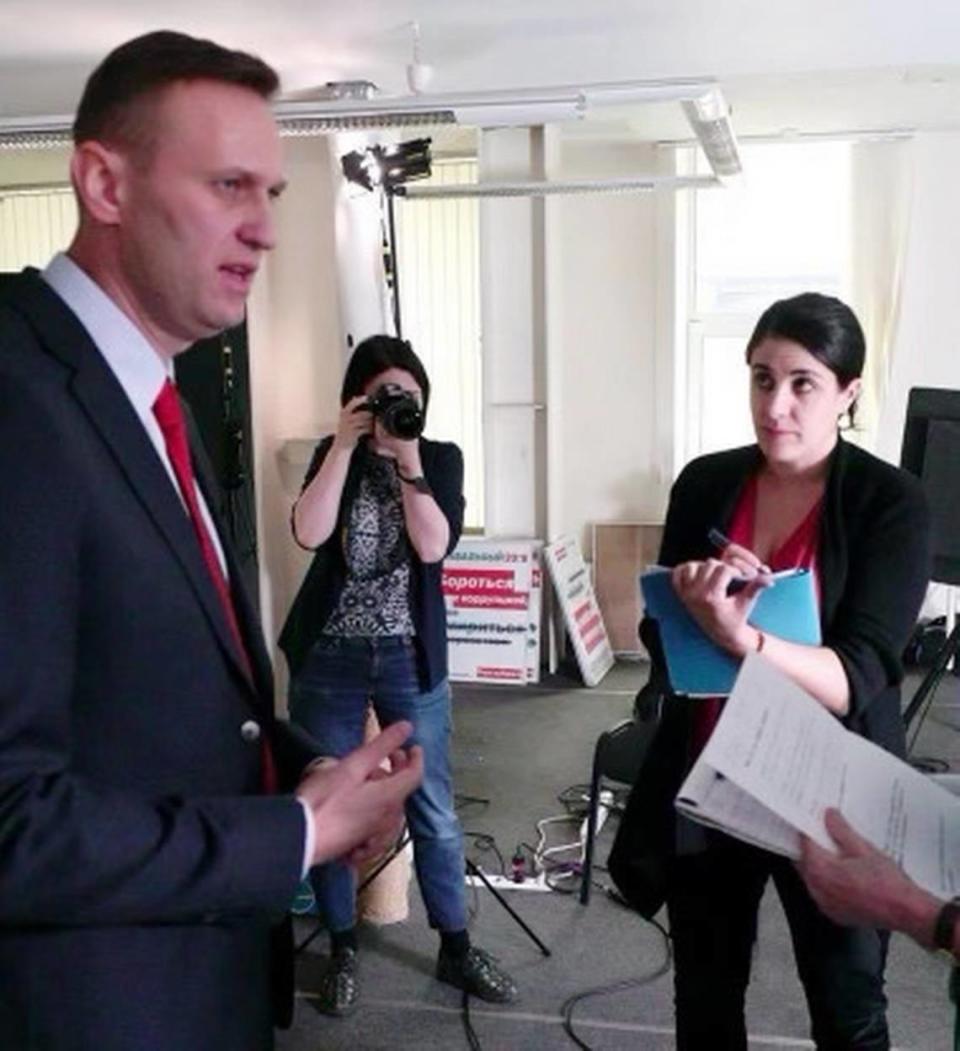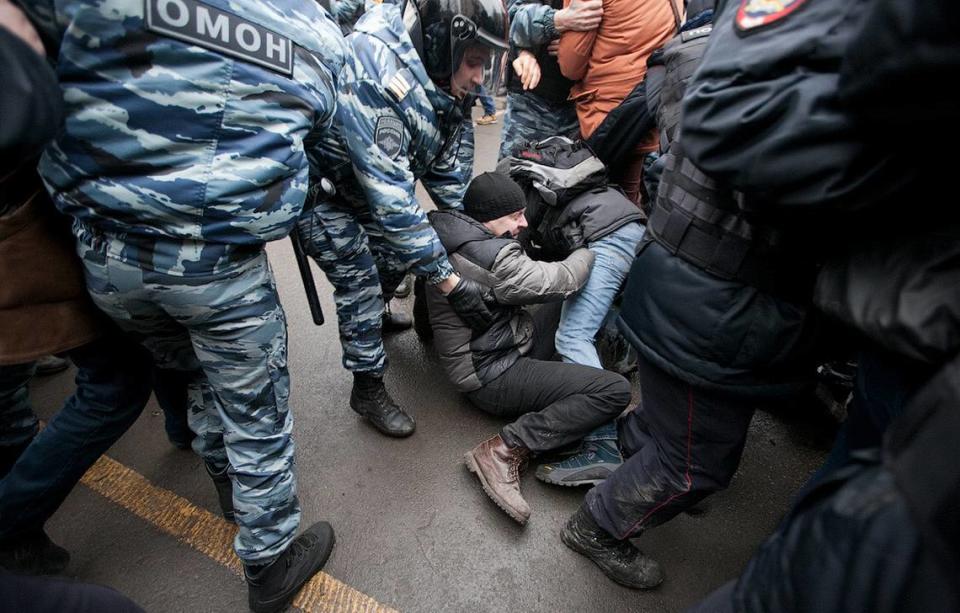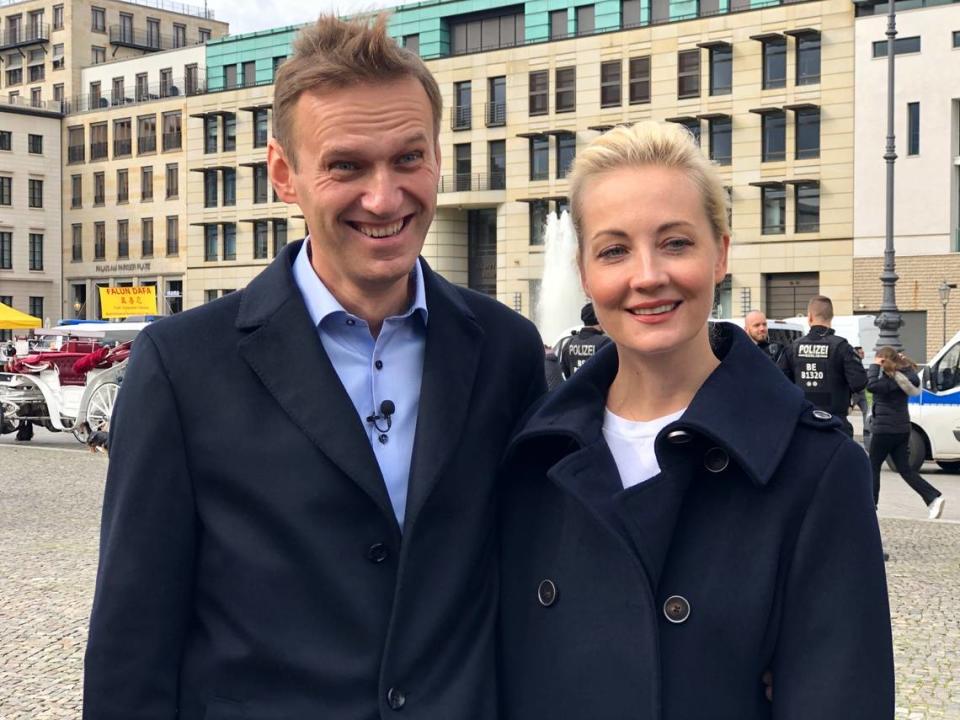Following death of Navalny, Sacramento Russians say they will step up anti-Putin protests
- Oops!Something went wrong.Please try again later.
- Oops!Something went wrong.Please try again later.
When Anna Berbeneva’s husband woke her at 3 a.m. Friday with the news that the Russian pro-democracy leader Alexei Navalny had died in an Arctic penal colony, she said his death hit her like a bolt of lightning.
Berbeneva, founder of the activist group Voices of Russian Opposition in Sacramento, said, “We expected that something like this could happen, but still, nobody could believe it. It’s like he was some kind of superhero. Nothing can break him or kill him. He always emerged with a smile for us.
“But now he is gone.”
For the past decade, Navalny and his Anti-Corruption Foundation have been a thorn in the side of Russian President Vladimir Putin.
Navalny survived a Kremlin-linked poisoning in 2020 that left him in a near-death coma and, more recently, inhumane treatment in frigid prisons after he defiantly returned to Russia in 2021.
In the middle of the night on Friday, following news of Navalny’s death, Berbeneva started exchanging messages with other Sacramento-area Russian anti-Putin activists. “We couldn’t find words to express our feelings, we just knew we had to organize a protest at the state Capitol that night. That is what Alexei would have wanted.”
Berbeneva’s shock and outrage were sentiments shared around the world.
Russian authorities said that the cause of Navalny’s death at age 47 is still unknown — and the results of any investigation are likely to be questioned abroad.
“Make no mistake: Putin is responsible for Navalny’s death,” U.S. President Joe Biden said at a White House news conference Friday, echoing the sentiment of other Western leaders.
Kremlin spokesman Dmitry Peskov slammed the accusations from Western leaders as “boorish” and “inadmissible.”
Navalny’s death has deprived the Russian opposition of its most well-known and inspiring politician less than a month before an election that is all but certain to give Putin another six years in power. It dealt a devastating blow to many Russians, who had seen Navalny as a rare hope for political change amid Putin’s unrelenting crackdown on the opposition.
Widow vows to continue fight against Putin
In an interview with The Sacramento Bee, Alexandra Poolos, a former “60 Minutes” producer who twice conducted interviews with Navalny — once in Russia in 2017 and again in 2020 in Berlin while he was recovering from the near-death poisoning — said she was profoundly impacted by meeting the activist and his wife, economist Yulia Navalnaya. “He was just brilliant, committed, larger than life. He was very much a Nelson Mandela figure.
“Alexei was investigating and publicizing hard evidence of Putin’s corruption and the inner circle of Kremlin’s corruption for years,” she said. “How these guys are just stealing money from their people, and living these lavish lifestyles. And he published a lot of data about how violent and corrupt the regime is.”

On Monday, his widow vowed to continue Navalny’s fight against the Kremlin.
With her voice cracking at times in a video posted on social media, Navalnaya accused Putin of killing her husband in the remote prison and alleged that officials’ refusal to hand over the body to her mother-in-law was part of a cover-up.
“They are cowardly and meanly hiding his body, refusing to give it to his mother and lying miserably while waiting for the trace of” poison to disappear, Navalnaya said, suggesting her husband might have been killed with a Novichok-style nerve agent.
The same agent was used in Navanly’s prior poisoning, Poolos said, which Navalny blamed on the Kremlin.
Poolos said when Navalny decided to go back to Russia after the poisoning at the start of 2021, the opposition leader understood the arrest and cruel treatment that awaited him.
“He was devout. You know, he believed in God,” she said. “After his near-death experience, I think he believed he was on a mission.”
In her video message, Navalnaya urged Russians to rally behind her “to share not only the grief and endless pain that has enveloped and gripped us, but also my rage.”
She continued: “The main thing that we can do for Alexei and ourselves is to keep fighting. ... We all need to get together in one strong fist and strike that mad regime.”
Berbeneva said that the turnout Friday night at the state Capitol for a “We Are Navalny” memorial was overwhelming. “We printed 700 Navalny faces for a flash mob, and it turned out we needed more.”
She said she was very grateful to the California Highway Patrol for responding so quickly to her group’s request for a permit.
“That might seem like a small thing. But keep in mind, just to lay flowers for Navalny is a dangerous act in Russia,” she said. “It’s incredible for people who have fled this monster Putin, to have police protecting their freedom of speech.”

Family trying to retrieve Navalny’s body
Navalny spokesperson Kira Yarmysh said that Navalny’s 69-year-old mother and his lawyers were not allowed into the morgue in Salekhard, the capital of the Arctic Yamalo-Nenets region, on Monday morning. The staff didn’t answer when they asked if the body was there, Yarmysh said.
On Monday, Ivan Zhdanov, the director of Navalny’s Anti-Corruption Foundation, said Navalny’s body would not be given to his mother for 14 days while a chemical examination of it takes place, according to a Russian investigator.
Yarmysh said the Investigative Committee, the country’s top criminal investigation agency, informed Lyudmila Navalnaya that the official probe into the death had been extended. “They lie, buy time for themselves and do not even hide it,” Yarmysh posted on X, the platform formerly known as Twitter.
With authorities offering no more information on the death after the brief initial statement, many Russians speculated about what might have happened to Navalny. Independent Russian outlets released reports attempting to shed light on his death. Some called into question the official narrative — but their reports were not possible to verify.
In Brussels on Monday, Navalny’s widow met with European Union foreign ministers and other officials. EU foreign policy chief Josep Borrell said the bloc was mulling sanctions against Russia and he also called for an independent international investigation into the causes of Navalny’s death.
Asked when Navalny’s body could be handed over to his family, Peskov responded that the Kremlin was not involved in those proceedings, adding that the official probe was continuing in line with the law.
Observers said that the law allows authorities to keep the body for a long time if the investigation is ongoing and block any requests for an independent forensic study.
Navalny’s ally Ivan Zhdanov denounced the Russian authorities as “lackeys and liars.”
“It’s clear what they are doing now — covering up the traces of their crime,” he wrote Monday.
Mourning, protests in Moscow and Sacramento
Since Navalny’s death, nearly 400 people have been detained by police in Russia as they streamed to ad-hoc memorials and monuments to victims of political repression with flowers and candles to pay tribute to Navalny, according to OVD-Info, a group that monitors political arrests. The U.S. and British ambassadors also mourned Navalny’s death at a memorial in Moscow.
Authorities cordoned off some of the memorials across the country and were removing flowers at night, but they kept appearing.
Before they fled Russia, Berbeneva’s husband, Mikhail Berbenev, worked on Navalny’s 2013 campaign to become mayor of Moscow. Berbenev was arrested in Moscow and detained multiple times protesting Putin’s first incursion into Ukraine and the annexation of Crimea in 2014.
The couple, with two toddlers, feared he could be subjected to a long prison sentence, so they fled to the United States, requesting asylum in Sacramento.
The capital region is home to an estimated 20,000 Russian immigrants, with many coming since the start of the war with Ukraine. Embracing the remarkable freedom to organize and speak freely, Berbeneva operates a slew of social media sites with information for newcomers. She says Voices of Russian Opposition in Sacramento has about 2,000 members.
Berbeneva also helps to organize a monthly coalition of Ukrainians and Russians who protest the decade of conflict.
‘This is a fight that should be important to everybody’
Russia’s Federal Penitentiary Service reported that Navalny felt sick after a walk Friday and became unconscious at the penal colony where he was being held. An ambulance arrived, but he couldn’t be revived, the service said.
After the last verdict that handed him a 19-year term, Navalny said he understood he was “serving a life sentence, which is measured by the length of my life or the length of life of this regime.”
In her video statement, Navalnaya said: “By killing Alexei, Putin killed half of me, half of my heart and half of my soul.”
“But I still have the other half, and it tells me that I have no right to give up. I will continue the work of Alexei Navalny,” she declared.
In terms of what the future holds, Poolos said “the Russian opposition is almost, annihilated.”
“But, on the other hand, a lot of people are saying that Navalny could become more powerful in death,” Poolos argued. “You can already see early indications of that. Over 400 people were arrested just trying to mourn this guy. It might also be that some of Putin’s supporters are gonna think this is a bridge too far, that he (Putin) did this.”

Poolos said Putin should be worried of widow Navalnaya: “She is extremely formidable. Navalny told me she was tougher and more single-minded than him.”
Berbeneva was already ready to follow Navalnaya’s advice, expressing an even stronger commitment to ending an unjust war in Ukraine and challenging the dictatorship in Russia. On Saturday, to mark the second anniversary of Russia’s latest invasion of Ukraine, a solidarity rally is scheduled on the state Capitol’s west steps at 4:30 p.m.
The activists say they hope to send a message to Congress to end the stalemate over arming Ukraine.
The following Tuesday, 7 p.m. on Feb. 27, Voices of Russian Opposition in Sacramento will hold another protest near the circle of lights at the Tower Bridge, commemorating victims of Putin’s regime, including Navalny. Berbeneva hopes many people — not just Russians and Ukrainians now in Sacramento — will attend because “this is a fight that should be important to everybody.“
The Associated Press contributed to this story.

